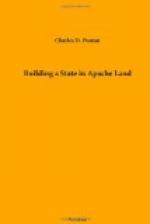Tubac became a kind of Gretna Green for runaway couples from Sonora; as the priest there charged them twenty-five dollars, and the Alcalde of Tubac tied the knot gratis, and gave them a treat besides.
I had been marrying people and baptizing children at Tubac for a year or two, and had a good many godchildren named Carlos or Carlotta according to gender, and began to feel quite patriarchal, when Bishop Lame sent down Father Mashboef, (Vicar Apostolic,) of New Mexico, to look after the spiritual condition of the Arizona people.
It required all the sheets and tablecloths of the establishment to fix up a confessional room, and we had to wait till noon for the blessing at breakfast; but worse than all that, my commadres, who used to embrace me with such affection, went away with their reybosas over their heads without even a friendly salutation.
It was “muy triste” in Tubac, and I began to feel the effects of the ban of the Church; when one day after breakfast Father Mashboef took me by the arm, (a man always takes you by the arm when he has anything unpleasant to say,) and said:—
“My young friend, I appreciate all you have been trying to do for these people; but these marriages you have celebrated are not good in the eyes of God.”
I knew there would be a riot on the Santa Cruz if this ban could not be lifted. The women were sulky, and the men commenced cursing and swearing, and said they thought they were entitled to all the rights of matrimony.
My strong defense was that I had not charged any of them anything, and had given them a marriage certificate with a seal on it, made out of a Mexican dollar; and had given a treat and fired off the anvil. Still, although the Pope of Rome was beyond the jurisdiction of even the Alcalde of Tubac, I could not see the way open for a restoration of happiness.
At last I arranged with Father Mashboef to give the sanction of the Church to the marriages and legitimize the little Carloses and Carlottas with holy water, and it cost the company about $700 to rectify the matrimonial situation in Santa Cruz.
An idea that it was lonesome at Tubac would be incorrect. One can never be lonesome who is useful, and its was considered at the time that the opening of mines which yielded nothing before, the cultivation of land which lay fallow, the employment of labor which was idle, and the development of a new country were meritorious undertakings.
The table at Tubac was generously supplied with the best the market afforded, besides venison, antelope, turkeys, bear, quail, wild ducks, and other game, and we obtained through Guaymas a reasonable supply of French wines for Sunday dinners and the celebration of feast days.
It is astonishing how rapidly the development of mines increases commerce. We had scarcely commenced to make silver bars—“current with the merchant”—when the plaza at Tubac presented a picturesque scene of primitive commerce. Pack trains arrived from Mexico, loaded with all kinds of provisions. The rule was to purchase everything they brought, whether we wanted it or not. They were quite willing to take in exchange silver bars or American merchandise. Sometimes they preferred American merchandise. Whether they paid duties in Mexico was none of our business. We were essentially free traders.




